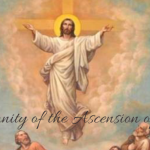
Answers to ancient Mediterranean problems come varied and contradictory in the library called “Bible.”
Answers. People need answers. Desperate for answers, many Christians misrepresent the Bible as a book of answers dropped down from heaven. They act as if it has all the answers to every possible question.
But the Bible does not give direct answers to 21st century American problems. Beyond that, the Bible does not provide only one answer for any problem of any culture or time. Please stop pooling ignorance by saying “The Bible says…” fellow Christians! The Bible is a library, not a single book. Libraries say many things in many different books, in many different types of literature.
Different Answers from Different Writings
Consider the First Testament many call “Old”. Context Group scholar K. C. Hanson observes interesting things about this section of our sacred library. He says that some of the Hebrew Scriptures were produced by segments of Israelite society that were capable of realizing their values. But not all! There are other sections of Sacred Scriptures written and edited by Israelites with values at odds with the dominant society.
Reading the Bible, one finds books produced by the elite urban establishment. Among these are legal codes, the priestly writings and redactions, Proverbs, and Sirach. Hanson explains that the idea that Israelite society can realize their values is clearly presupposed by these documents. Therefore, these writings address and answer problems accordingly.
But take the book of Job and most prophetic writings. Here things are quite different. The people who produced these documents belonged to frustrated groups. These Israelites were perennially stymied at achieving their values. Therefore, as far as dealing with Israelite crises and problems, they offer very different answers than the urban-establishment Scriptures do.
For Some, Many Different Answers for One Problem
What does the Bible say about dealing with our contemporary situations? If it’s an American asking that, the answer is, “NOTHING directly.” The Bible offers no direct answers for modern life.
But if it is an ancient Israelite asking that, Hanson explains that the answer depends on the place in society from which a given Scripture originated. If a Scripture comes from the urban elite, the answer will be something like, “Stay the course and positive change will eventually happen.” But if you are reading from a different section in Scripture, written by frustrated authors, the answers offered will include a necessary revolutionary change.
So what does the Bible say again? It says many different things. It offers many different answers!
Answers from Torah
The foundational myths found in Genesis come from different periods and social groups. The Yahwistic account of Genesis 2:4b— 3:24 comes from the court of King David around 950 BCE. The Priestly account of Genesis 1:1—2:4a is Persian, authorized by a Persian-appointed official or High Priest, and written by Persian scribes around 400 BCE.
Despite these tremendous differences, Hanson explains that both creation myths are oriented for urban groups capable of realizing their values. Not only do they provide divine origins for the status quo, these myths neatly confirm distinctions and social values.
Hanson affirms that what is true for the creation myths also applies to Torah legal “codes” like Exodus 20:22—23:33. To deviate from custom is shameful—it is “sinful” and “criminal.” Folk wisdom such as the Proverbs and Sirach agree. These documents interpret the world as being well-ordered. They teach that the status quo must be affirmed. Custom must be kept.
Any cry of “But we need change!” can only be social deviance according to these documents. Family shame (Proverbs 28:7; Sirach 5:14—6:1), poverty (Proverbs 13:18), and utter ruin is the inescapable fate of such wicked fools (i.e., social deviants). Those who disagree are doomed sinners. Those who agree and comply are “righteous” and “wise” (Proverbs 10—15). The only acceptable change is the kind arriving at a snail’s pace and organically. Thus, anything faster upsets the apple cart and is therefore social deviance.
Answers from the Prophets
But what about radical Old Testament literature? Hanson says that Israelite groups frustrated in realizing their values gave rise to most of the classical prophets. We are talking about Elijah, Amos, and Jeremiah. The literature associated with these figures demonstrate their goal was radical change (“repentance”) of Israelite society, both for common folk and elites. They called for severe change in behavior, social structures, and policies.
The radical prophets cry “REPENT!” and offer “prophecies of doom.” Hanson shows that all of this indicates tears in the social fabric, cracks between social values and human experience, cultural ends and the means wielded by institutions.
And with whom are the prophets repeatedly engaged in bitter conflict? It is with the urban elites and temple authorities. The prophets critique Israelite social structures, policies, and failures at living up to the values. They threaten to turn the whole social order upside down (e.g., 1 Kings 21:1–29; Isaiah 20:1–6; Jeremiah 26:1–24). Prophets speak of assured immanent disaster for refusing to respond to their criticism. The monarchy is doomed. Foreign powers will invade. Our leaders will die. The temple will burn. Famine and drought will kill us. People will be exiled as slaves. The land will be lost.
And the traditional means of assuring divine favor and avoiding disaster? These the prophets demean as being useless (e.g., Amos 4:4–5; Isaiah 1:11–13). Animal sacrifices are not what is required. What is needed is precisely what Israel refused to do—justice and loyalty, righteousness and purity. The elites who defend the status quo glaringly refuse this essential and radical medicine.
New Testament Answers
Hanson explains that the New Testament is not at all like the urban-produced Hebrew Scriptures in giving answers to Israelite problems. Cosmic upheaval is the background for it. The majority of New Testament documents relate far more strongly to the Prophets. Therefore, most of the New Testament is ideologically radical. After all, these Scriptures were produced by communities somewhat ajar with the values dominant Mediterranean cultures celebrated.
Hanson says that early Jesus groups watched for forthcoming theocracy, a radical reorientation and restructuring of Israelite society. Addressing crises and problems, the New Testament thus favors drastic change. Judean elites clearly got this (Acts 6:14; 4:19-21).
Right in step with the radical stance of the Prophets, we can summarize the innovations of John the Dunker (Mark 1:1-4; Luke 3:7-14) and Jesus (Mark 1:15; Luke 4:18-21). These were radical calls to metanoia and new theocractic social order. Just holding office or traditional authority no longer legitimated anything! Hanson explains that Jesus radically challenged even the primary authority of one’s own kin (Mark 3:31-35). Jesus likewise challenged interpreting the Law in a conservative fashion (Matthew 5:21-22). Pious platitudes didn’t nail Jesus to the wood. But challenging the status quo eared him crucifixion.
Hanson presents Paul contending that Jesus group members exist in a continual process of transformation. For Paul, messianists are undergoing “metamorphosis” into the likeness of God. Paul says God effects this “new creation” (2 Corinthians 3:18; 5:17; Galatians 6:15). Radical Paul even challenges distinctions based on custom, status, and gender (Galatians 3:28).
Beyond Radical: The Johannine Antisociety
The New Testament shares the radical stance of the Israelite prophets of old. But Johannine literature goes farther still. The antilanguage gospel called “John” is “anarchist” according to J. C. Hanson and his fellow Context Group scholars. “John” favors transformation of values and the destruction of the dominant society Israel (what its antilanguage calls “the world”).
The Synoptics and Paul considered themselves Israel, even if a reformed Isarel. They understood themselves to be “Israel awaiting the theocracy proclaimed by Jesus.” Not so the Johannine Jesus group! Although stemming out from biblical Israel, Johannine messianists saw themselves as a conscious alternative to that doomed, dominant society. The Johannine Jesus group called themselves the Tekne Theou (“children of God”) and believed themselves to be a new kind of humanity.
In several ways Hanson shows that “John” parts with the Synoptic Gospels. Different from “Mark,” “Matthew,” and “Luke,” “John” places emphasis on fully developed characters (e.g., the Samaritan woman) having personal encounters with Jesus (John 4:4-42). The Fourth Gospel also emphasizes going beyond Judean rites and sacred space (John 4:21-23).
In “John” one must “believe into” Jesus and have unmediated attachment to him as sole broker of divine patronage (11:25-26). In the Johannine Jesus, the remote past becomes immediately available in the present (6:32-34). The Johannine Jesus gives a “new commandment”—sticky, ingroup-glue for others in Johannine Jesus group (13:34-35).
Many Different Answers
As we have seen thus far, the Bible, when addressing Israelite problems, offers different answers, directions, and perspectives on change be it social or of values. But Hanson explains that no matter what section of Biblical literature one reads, one theme found everywhere in the library is that God is always consistent and unvarying (Numbers 23:19; 1 Samuel 15:29; James 1:17). The author of the essay called “Hebrews” says that Jesus shares in this divine consistency (Hebrews 13:8).
But some texts nevertheless claim that God does indeed change. God changes God’s mind or turns from a specific course of action. Isn’t this change in some way? Hanson says such change in action is a response to human change or pleading (e.g., Exodus 32:14; 1 Samuel 15:35; 2 Samuel 24:16), never an alteration of divine character or purpose.
Bible Answers for 21st Century Western Christians
Hanson explains that in liberal societies such as the United States—the most individualistic society of all time—everything is oriented to the individual. Here individuals can realize their values. Society must forever be refined for maximum efficiency.
Ours is a future-oriented society. Because of this we expect continual change. We expect progress to be fast-served and constant. We are to be ever faster, ever better, more refined, more enhanced, and more perfect.
Until we reach the final moment before the waterfall of disaster (e.g., climate change), we wouldn’t dream of ever criticizing our beloved technology! And once there at the crisis-point, we never dare consider solving it by returning to earlier, more primitive simplicity. Our solutions must be more creative, clever, and sophisticated. Our heroes are Spock, Sherlock, and Dr. House. If we love Jesus, we transform him into these fantasies.
The Bishops and Fundamentalists
Back in 1987, prior to fundamentalist cable network EWTN becoming the “loudest voice’ for U.S. Catholicism, American Bishops issued a brief document called a “Pastoral Statement for Catholics on Biblical Fundamentalism.”
In it we read—
“We do not look upon the Bible as an authority for science or history. We see truth in the Bible as not to be reduced solely to LITERAL TRUTH, but also to include SALVATION TRUTHS expressed in varied literary forms.”
How would you distinguish a “literal truth” from a “salvation truth”? What is a salvation truth, anyway? Can you find any in your Bible? How would you apply this to Genesis 1—11? How do we find “salvation truths” within a library of such conflicting perspectives on change and dealing with crises?
Back in 1987 that same document cautioned U.S. Catholics against “an effort to try to find in the Bible all the direct answers for living.” Why? It is because they cannot be found in there. Indeed, the Bible itself never claims such authority anywhere! So why would any Bible reader think that?
How Could the Bible Answer Our Dilemmas?
Consider: what does the Bible know about nuclear power? Nuclear weapons? WMDs? What does it know about microscopes and telescopes? Can it tell us anything about social media? Ecology? Globalism? Capitalism? Socialism? Communism? Overpopulation? Space travel? Science? Possible life on Europa? Advanced extra-terrestrial civilizations?
If the Bible is silent on these and related matters, how then can it offer any “direct answers” to problems for our 21st century Western daily living?
Inspiration happens in, folks. It’s messy and far from perfect. The biblical authors were human beings after all. They only were equipped with normal human powers and abilities—inspiration didn’t change that! Specifically biblical authors were Mediterranean personalities. In this way, they were the same as the Biblical characters they wrote about. Thus, they reflect the culture, customs, and styles of perceiving, thinking, speaking, and writing about Mediterranean culture.
It is both humorous and tragic that fundamentalistic authority figures in the Church today think of themselves as being more Christ-like than progressives challenging their positions. Our Church numbers decline in free-fall, but let’s maintain the status quo, even hard-line positions. They expect a 1950s “Golden Age” Catholicism to answer 21st century problems.
Getting Creative
Some have become creative with this. Father Richard Rohr, drawing from Walter Brueggemann and ,Marcus Borg, sees the tripartite arrangement of Hebrew Scriptures—Torah, Nevi’im (Prophets), and Ketuvim (folk wisdom writings)—as representing sequential stages in human consciousness. So Torah is interpreted as a safe, conservative, beginning place for establishing an identity container, where self-worth and necessary boundaries are secured. This is construction, says Rohr, which ought to come first. It learns “us” in relation to “them.”
Then with the Prophets comes necessary deconstruction and self-criticism. According to Rohr the Prophets are for this reason seldom drawn from by later Jews and Christians who tended, like most groups, to disdain self-criticism. According to Rohr for five centuries following the Reformation the Catholic Church did not allow critical reflection and seeing our shadow-self. Rohr says that for two centuries the same can be said for America.
Then comes the third stage, the folklore writings which represent wisdom. Rohr says this stage in human consciousness is rarely entered by people, unfortunately. Humans become comfortable with paradox and contradiction at this stage. Therefore, they become open to “alternative wisdom” and new possibilities.
This spiritual understanding of the tripartite arrangement of Hebrew Scriptures may have merit. Although unintended by the various hands who arranged our “Old Testament,” and not exactly in sync with what Hanson lays out above, certainly human groups and individuals do develop and grow by deepening awareness. Hopefully 21st century Catholics will grow in awareness concerning what Scripture is and is not.
















